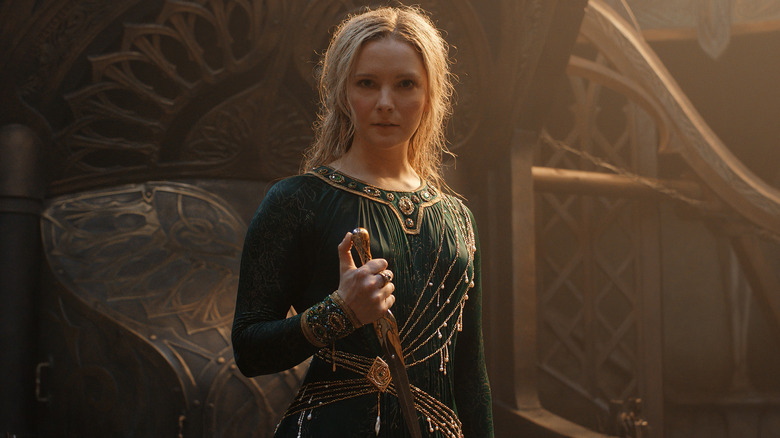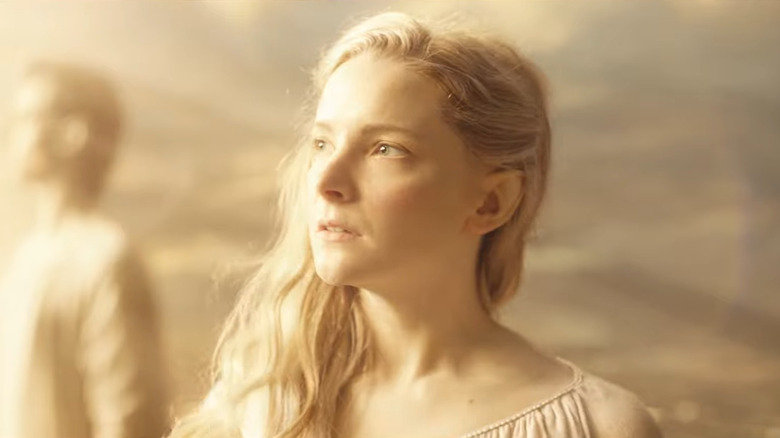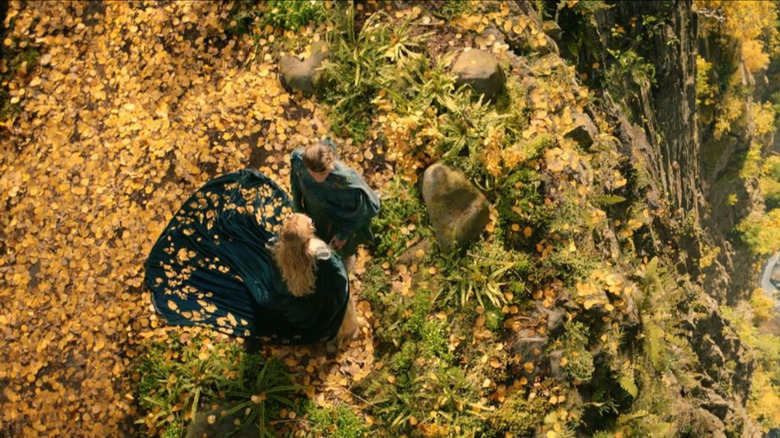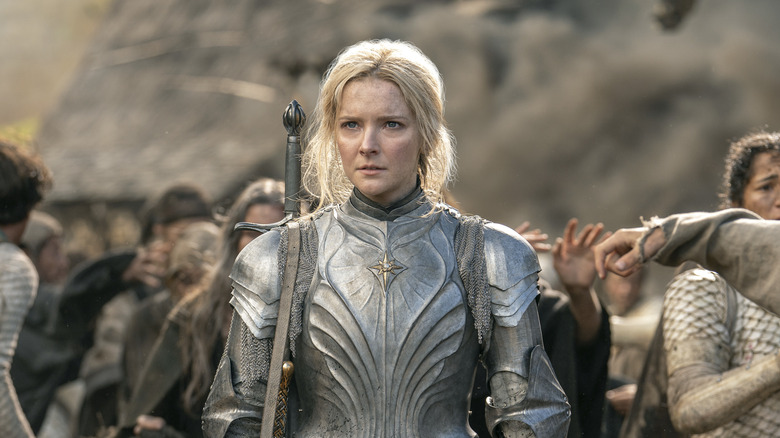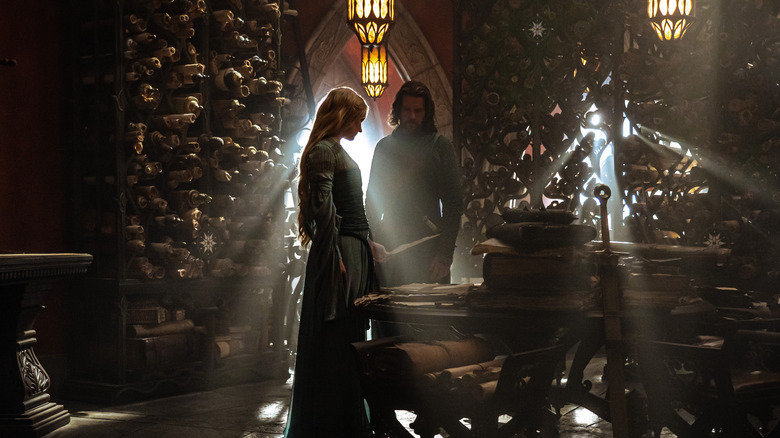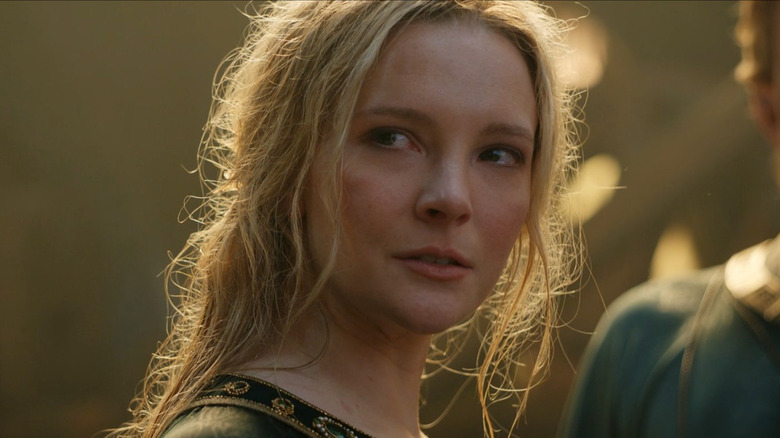Rings Of Power Season 2 May Explain How Lord Of The Rings' Galadriel Got So Powerful
In a recent For Your Consideration panel put on by Amazon Studios (via Collider), Morfydd Clark shed some light on the upcoming Season 2 of the studio's "The Lord of the Rings: The Rings of Power" series. Clark, who plays Galadriel on the show, wasn't overly descriptive. Instead, she simply hinted that more Rings of Power will be forged in the upcoming season ...and her character will be wearing one of the Three Elven Rings that were forged in the fading moments of the Season One finale.
In another interview from the FYC event transcribed by Deadline, Clark elaborated a bit further, explaining that "[Galadriel's] about to have a life-changing thing happen to her. She's about to become acquainted with Nenya, her ring. It's really exciting to see how the magic creeps in." Shortly after this, she added, "When we finished Season 1, the rings were being made and we knew it was going to be a huge change for Middle Earth [sic]. [Galadriel] is going to be part of that change because she has her own ring."
The hints at a game-changing evolution, both for Galadriel and Middle-earth, seems to indicate that Season 2 of showrunners J. D. Payne and Patrick McKay's series is going to begin taking Galadriel on the journey from ambitious Elven princess to veteran, Ring-wielding leader and counselor — a character arc that is clear throughout Tolkien's original writings — in a fractured kind of way. Let's try to piece everything together and get a glimpse of how Galadriel matures throughout the source material ... and how that could translate to "The Rings of Power" story.
Piecing together Galadriel's character arc
In the book "The Treason of Isengard," J.R.R. Tolkien's son, Christopher, explains that the first reference Tolkien ever made to Galadriel was while writing "The Lord of the Rings." Just like Aragorn, Treebeard, and a host of other iconic characters, the author made up these integral parts of his larger world in real-time, as he wrote his trilogy.
As soon as Galadriel was on the scene, it was pretty obvious that she was important, and Tolkien spent decades trying to work her backward into "The Silmarillion," which he had already been working on for decades at that point. He only partly succeeded — in "Unfinished Tales," Christopher introduces Galadriel and Celeborn's portion of the story by saying, "There is no part of the history of Middle-earth more full of problems than the story of Galadriel and Celeborn." Nevertheless, we can still puzzle together several mentions of the Lady of Lorien over time, all of which add up to a pretty impressive individual.
For instance, Galadriel has a ridiculously impressive family tree (which is a big deal in Middle-earth). She has kingly and queenly grandparents, uncles, and brothers. Her daughter marries Elrond. Her granddaughter becomes the Queen of Gondor. The list keeps going, guys.
Personally, Galadriel is really old (over 8,000 years old during "The Lord of the Rings"). This makes her a natural source of wisdom. She's seen the light of the Two Trees with her living eyes, too, which puts her in a special group of enlightened Elves called the High Elves.
Galadriel's physics, friends, and insightful analysis
Galadriel is physically impressive, too. Along with her famously bright, golden hair, she's also extremely tall and the book "The Peoples of Middle-earth" describes her thusly, "She was strong of body, mind, and will, a match for both the loremasters and the athletes of the Eldar in the days of their youth." Her mother's name for her was Nerwen. Translation? Man-maiden. Yeah.
Galadriel uses her impressive natural gifts from an early age. She's described in "Unfinished Tales" as proud, strong, and selfwilled. She doesn't want to be tutored, and she wants to rule kingdoms.
All the same, she's diplomatic and knows how to network. At various points, she befriends kings and Wizards. She learns from the Valar and Maiar — the angelic guardians that help shape and then guard and watch over Middle-earth. She's also described as having an unusual knack for seeing through people and understanding who they really are.
"Unfinished Tales" describes this by saying, "From her earliest years she had a marvellous gift of insight into the minds of others, but judged them with mercy and understanding." Using this gift, she calls out multiple Middle-earth antagonists well before they're openly hostile, including the Dark Lord Sauron (while he's in disguise as the gift-giver Annatar), the treacherous Wizard Saruman, and her own violently headstrong uncle Fëanor.
Galadriel's initial descent into darkness
While Galadriel is generally seen as a somber yet positive protagonist, there is plenty of evidence that she goes through a rough patch earlier on in her very long life. Tolkien's earlier versions of the Galadriel story have her rebelling along with her people, even if she does so without joining in some of their more damnable actions. Over time, he reworked her to have a more neutral stance, but no matter what, she is always depicted as a proud, headstrong Elven princess who wants to rule lands of her own out in the wide world.
When the Two Trees are destroyed (an act that takes place in the opening scenes of the first episode of "The Rings of Power"), Galadriel's overstretched immortal childhood joy is cut short, and she finds herself among the Noldorin Elves who seek vengeance for the destructive act. The specifics aren't worth detailing here. (There are a lot of them.) What really matters is the effect that this has on Galadriel's personality.
The aftermath of the destruction of the Two Trees impacts all of Galadriel's people, including herself. "The Peoples of Middle-earth" states, "Galadriel was born in the bliss of Valinor, but it was not long, in the reckoning of the Blessed Realm, before that was dimmed; and thereafter she had no peace within." A bit later it adds that a darkness and shadow of evil had fallen on all of her people, including herself. This is the struggle that we see the character still battling during Season 1 of the show. But the same text adds that, with Galadriel, this inner darkness was counterbalanced by other factors, including her remarkable insight and generous spirit.
Galadriel in the Second Age
So, how does all of this backstory translate to "The Rings of Power?" A lot of it has to do with the Second Age, which is when that story is set. Galadriel has an important role during that period of time in the source material. Her initially dark days after the dimming of the Two Trees are far behind her, but she's still just beginning her maturing journey through life. During that age, she and her husband, Celeborn, help lead multiple groups of Elves. They move from place to place, and Galadriel makes friends with the Dwarves and finds her way to her future realm of Lothlorien.
Throughout this time, Galadriel plays an important role in rejecting Sauron when he shows up in disguise to help the Elves forge Rings of Power. She recognizes the might of the Dwarves as military allies. Oh yeah, and she eventually keeps one of the Rings of Power, called Nenya, for safekeeping, too.
To be fair, in the source material, there isn't much sign of her actually using her Ring before the Third Age (i.e. after Sauron is destroyed and his One Ring isn't a current threat anymore). On the contrary, she actually counsels against the Elves using their Rings.
Based on Morfydd Clark's comments, Payne and McKay's series will likely fudge this fact and have Galadriel use the ring during the Second Age — at least until the One Ring is forged and ruins the party. It also appears that this could be a catalyst to begin developing Galadriel from a cold, calculating warrior into the wise Elf-maiden and queen that we all know and love.
The Third Age transition from hands-on leader to overpowered counselor
Once Sauron forges the One Ring, we can assume Galadriel won't use hers for fear of revealing her thoughts to her enemy. In this brief pre-One-Ring period, though, we'll get to see warrior Galadriel begin to touch a power that is far beyond anything she ever dreamed of.
To be clear, this isn't the violent military power Morfydd Clark's Galadriel is used to using to get her way. At the Council of Elrond in "The Fellowship of the Ring" book, Elrond specifically explains that the Elven Rings "were not made as weapons of war or conquest: that is not their power. Those who made them did not desire strength or domination or hoarded wealth, but understanding, making, and healing, to preserve all things unstained."
Here's hoping Amazon's series uses Galadriel's ring to turn her into a more well-rounded leader. After all, we know what kind of character she will end up being when all is said and done. "Unfinished Tales" describes the much older version of Galadriel in "The Lord of the Rings" as one "potent mainly in wisdom and goodness, as a director or counselor in the struggle, unconquerable in resistance (especially in mind and spirit) but incapable of punitive action."
"The Peoples of Middle-earth" adds to this picture of an indomitable spirit shaped by immortal wisdom by saying, "Galadriel was the greatest of the Ñoldor, except Fëanor maybe, though she was wiser than he, and her wisdom increased with the long years."
The long journey of Ring-infused experiences that takes this naturally gifted Elven leader from a headstrong youth to a veteran queen will begin in Season 2 of "The Rings of Power." What that transition looks like, though, remains to be seen.
